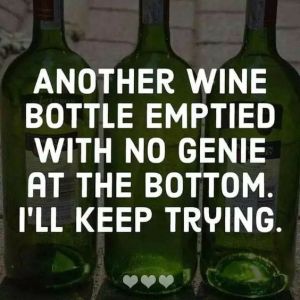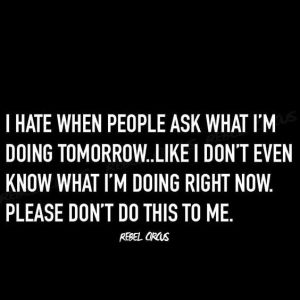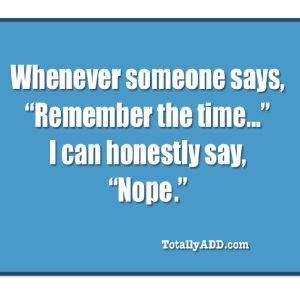We ADHD ers have difficulty making choices.
I’ve collected too many links, so I’m going to dump them now. You pick and choose. It’s up to you now.
Doug
Links:
Personal Notes O the Day:
- I was 64 years old when I realized that I have ADHD, and of course, had had it all my life. That explained so many things. I also realized that many of the things I did out of habit or routine were actually strategies to help me cope with my ADHD. Since then, I’ve focused on making new strategies and refining the old ones. It’s a continuing process and has made my life much better. Also, after trying Ritalin and having some mild side effects, I switched to Daytrana, Ritalin in a skin patch, and it works very well for me.
I’m a big fan of strategies and have written two ADHD books: Your Life Can Be Better, using strategies for adult ADHD, and Living Daily With Adult ADD or ADHD: 365 Tips O the Day
An ADHD expert, Dr. William Dodson, says that the purpose of the medication is to help us focus enough to use the strategies.
2. I’ve said it before, multiple times in fact, but it bears repeating:
Our whirlpool refrigerator works fine. The only thing wrong with it is the ice system. The only thing wrong with the ice system is that it’s a total piece of crap.
3. Ventilating is said to be helpful in dealing with frustration.
Question O the Day:
Do any members want an explanation about DSM?
Helpful Note O the Day:
The memes are all there below the big DSM ad. You can just scroll down.
Bonus Note O the Day:
The Diagnostic and Statistical Manual of Mental Disorders, Fifth Edition, Text Revision (DSM-5-TR), is the most comprehensive, current, and critical resource for clinical practice available to today’s mental health clinicians and researchers. DSM-5-TR includes the fully revised text and references, updated diagnostic criteria and ICD-10-CM codes since DSM-5 was published in 2013. It features a new disorder, Prolonged Grief Disorder, as well as codes for suicidal behavior available to all clinicians of any discipline without the requirement of any other diagnosis.
With contributions from over 200 subject matter experts, this updated volume boasts the most current text updates based on the scientific literature. Now in four-color and with the ability to authenticate each printed copy, DSM-5-TR provides a cohesive, updated presentation of criteria, diagnostic codes, and text. This latest volume offers a common language for clinicians involved in the diagnosis and study of mental disorders and facilitates an objective assessment of symptom presentations across a variety of clinical settings—inpatient, outpatient, partial hospital, consultation-liaison, clinical, private practice, and primary care.
Stay current with these important updates in DSM-5-TR:
- Fully revised text for each disorder with updated sections on associated features, prevalence, development and course, risk and prognostic factors, culture, diagnostic markers, suicide, differential diagnosis, and more.
- Addition of Prolonged Grief Disorder (PGD) to Section II—a new disorder for diagnosis
- Over 70 modified criteria sets with helpful clarifications since publication of DSM-5
- Fully updated Introduction and Use of the Manual to guide usage and provide context for important terminology
- Considerations of the impact of racism and discrimination on mental disorders integrated into the text
- New codes to flag and monitor suicidal behavior, available to all clinicians of any discipline and without the requirement of any other diagnosis
- Fully updated ICD-10-CM codes implemented since 2013, including over 50 coding updates new to DSM-5-TR for substance intoxication and withdrawal and other disorders
- Updated and redesigned Diagnostic Classification
This manual is a valuable resource for other physicians and health professionals, including psychologists, counselors, nurses, and occupational and rehabilitation therapists, as well as social workers and forensic and legal specialists. The new DSM-5-TR is the most definitive resource for the diagnosis and classification of mental disorders.
Coming March 2022!
#ADHD, #adultADHD, @dougmkpdp, @addstrategies, @adhdstrategies






Pingback: Understanding ADHD | ADDadultstrategies
I’m goint to be all over that dyscalculia link. Not because I suffered at math, but because I excelled at it. Or almost did, anwyay. I always say: I was a good student at math, but never a great student. Because I could understand the most intricate functions, and then I’d go 3×3=6. And then I’d get to the end of a problem, knowing the solution was wrong, trying to find the mistake and not finding it.
But I did love math, because it didn’t involve long study sessions for me: I understood things, and then I’d do one or two exercises and I’d be good with it. It was long sessions sitting down, reading long texts and memorizing that did me in.
LikeLike
ram
me too.i would work a very difficult problem correctly and then make an addition error and get the answer wrong and no credit. until i got up to very high math, beyond calculous, and then i couldnt solve the problem anyway. and great trouble learning until i finally learned how to study.
i always appreciate your comments.
thank you
best wishes
doug
LikeLike
Doug,
The gifs that you include at the end of each post always make me laugh and smile. I can barely ever remember what I did yesterday. Mondays at work are always a let down because I can never remember what I did when someone asks ” what did you do over the weekend?” I say all this because it will be fine if you ever need to reuse some of the gifs, you won’t remember if you posted it already and we won’t either. In the end it’s just more laughs and smiles.
Thank you!
LikeLike
bj
well, your comment made me smile. ADHD memory is a booger.
thank you for commenting
best wishes
doug
LikeLike
Another good one!❤️
Sent from my iPad
LikeLike
martha
thank you. you have excellent taste.
love
doug
LikeLike